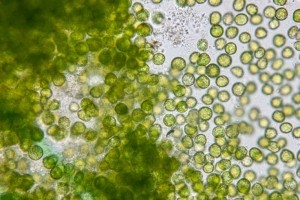Unilever and Algenuity discuss the potential of microalgae: ‘Algenuity’s technology unlocks a wealth of food applications’

Unilever and Algenuity have announced a partnership that will enable Unilever’s Food and Refreshment R&D team to leverage the biotech start-up’s unique algae processing technology and ingredients to bring food made with microalgae to the mass market.
Algenuity, which specialises in developing microalgae for use in consumer products, will work with the R&D team within Unilever’s Foods and Refreshment (F&R) division.
Sustainable and nutritious
By 2050, the global population is set to reach 9.8bn people according to the UN. To feed this growing population, the world will need to produce 70% more food. However, this must be achieved within planetary boundaries for land and water use as well as food-related emissions.
Unilever has prioritised developing alternative protein sources like microalgae, which it says represents a ‘significant step’ forwards in the ‘critical shift’ needed to build an ‘equitable and resilient food system’.
Microalgae like Chlorella vulgaris – the species cultivated by Algenuity – are highly efficient sources of plant protein that can be produced year-round, at scale, and with a low land, water and carbon footprint.
“In sustainability terms, the resource utilisation is highly favourable and cropping cycles are unlimited across the year. Chlorella grow very fast and reach high numbers when cultivated under controlled conditions in closed vessels. The use of these so-called fermentation systems allows for sustainable and safe production at large scale, as well as the efficient use of resources such as energy, fertilisers and water. Part of the partnership will involve a full life cycle assessment process and identification of further areas where sustainability measures can be further improved upon,” Manfred Aben, Unilever VP Science & Technology for F&R, told FoodNavigator.
Microalgae also offers nutritional benefits, including a higher protein yield than many other plant-based protein sources. Microalgae’s protein yield is reported at 4–15 tons/Ha/year compared to 0.6–1.2 tons/Ha/year for wheat, pulse legumes and soybean, according to data from Wageningen University.
Additionally, the presence of various bio-active components in microalgae provide an added health benefit. Microalgae contains healthy lipids, antioxidants and various micronutrients. Microalgae is a source of vitamins A, B1, B2, B6, B12, C and E and minerals such as potassium, iron, magnesium, calcium and iodine.
“Microalgae like Chlorella vulgaris are a good source of essential macronutrients and micronutrients, including antioxidants and minerals such as iron. Microalgae also contain fibre, vitamins and essential amino acids. Our bodies cannot produce these critical nutrients, therefore it’s important we obtain them from our diet, and microalgae offers a sustainable way to do that,” Dr Andrew Spicer, CEO of Algenuity, explained.
Algenuity tech tackles bitter taste and smell
Dr Spicer told us that Algenuity was founded ‘with the goal to focus on food-grade and scalable technology development’.
The company decided to focus on Chlorella vulgaris – a variety of microalgae known for its robustness and high protein content – because of its potential to scale production through fermentation. And, as Chlorella vulgaris was already on the market in Europe ahead of 15 May 1997, the ingredient is not subject to Novel Food laws.
“The decision to focus on Chlorella vulgaris was clear from day one: this type of algae has been safely consumed for years and has been commercially available as a food product in the EU since 1997, which brings advantages with respect to regulatory approval,” Dr Spicer explained.
“Very few microalgae are both approved as novel foods and fermentable and capable of being produced at sufficient scale to make an impact within the broader food and beverage industry, especially where displacement of animal sources of protein or less sustainable plant-based sources is a priority.”
The nutritional and sustainability credentials of microalgae have made it a mainstay in the nutraceutical space.
However, food innovators face organoleptic challenges that can hinder the inclusion of microalgae in food formulations. Algae’s high chlorophyll content, which gives plants their green colour and a bitter taste and smell, has proven a barrier to inclusion in mainstream diets.

So, how does Algenuity overcome the taste and smell issues associated with Chlorella vulgaris and other microalgae ingredients?
“The varieties of Chlorella vulgaris are developed using non-GM plant breeding methodologies with screening for varieties that are deficient in chlorophyll. Just like autumn when chlorophyll is lost from the leaves of deciduous trees, when the chlorophyll is no longer made by Chlorella, Algenuity can identify variants that are yellow, lime, white and even red,” Dr Spicer revealed.
“This results in variants with different colours that are neutral in taste. These variants are stable and natural, and have the potential to unlock a wealth of opportunities in algae-based food applications. As such, as well as the plant-based protein, they also deliver natural pigments, which are almost always antioxidants.”
The result is Algenuity’s Chlorella Colours, whole algal-cell ingredients that provide a source of neutral-tasting, functional plant-based protein. The trademark protected Chlorella Colours platform offers natural, non-GM, allergen-free and clean label solutions.
Unlocking innovation opportunity
Unilever believes Algenuity’s technology opens up a variety of potential applications in the food and beverage sector.
“Ensuring our products taste great is always a top priority. We want our consumers to enjoy our brands and products and to continue to choose them,” Unilever’s Aben explained.
“The R&D collaboration will harness Algenuity’s technology to neutralise the taste and smell of the microalgae, so we can provide consumers with healthy Unilever food products that still contain all the nutritional benefits of the protein. Chlorella is low fat, low sugar, high fibre, has very high-quality plant-based protein and an attractive combination of micronutrients. We believe that this process will unlock exciting possibilities and help facilitate the transition of microalgae into mainstream diets.”
Microalgae innovation in the everyday food and beverage market is almost a blue-sky opportunity for Unilever’s brands. Aben flags the potential across various established categories to deliver added nutritional benefits.
“Microalgae offer huge potential to bring a nutritional benefit to foods we already know and love. For example, this may include baked goods, pasta, soups and sauces to name a few. Algenuity’s Chlorella Colours technology… allows the inclusion of microalgae as a food ingredient with a neutral taste and smell but with all the nutritional advantages... as well as emulsifying properties.
“The partnership between Unilever and Algenuity will explore this further: Algenuity will provide the Chlorella ingredients for formulation and product development by the R&D team in Unilever’s F&R division.”
The partnership agreement will mean ‘certain aspects’ of Algenuity’s tech are ‘exclusive’ to Unilever, Aben added.
Plant-based innovation is an important priority for Unilever. Plant-based products now make up around a third of the company’s portfolio, including dairy-free and vegan options such as Hellmann’s Vegan, Magnum Vegan and Vegetarian Butcher brand.
Unilever believes microalgae can help drive further plant-based product development thanks to its amino acid profile, something many plant-based formulations currently struggle with. “Algae are a potential source of high-quality plant-based protein, which can be used in plant-based products to replace animal protein. These products will appeal to a variety of consumers; for vegans and vegetarians but also for flexitarians and meat-eaters looking to reduce their consumption of animal products.
“Microalgae accumulate large amounts of high-quality proteins that are rich in essential amino acids. Like vitamins, essential amino acids are important building blocks that are needed for good health. However, the body cannot produce these on its own, making it essential for us to obtain them from our diet. In addition, microalgae are a good source of essential macronutrients, and micronutrients such as antioxidants, vitamins, and minerals like iron.”


























